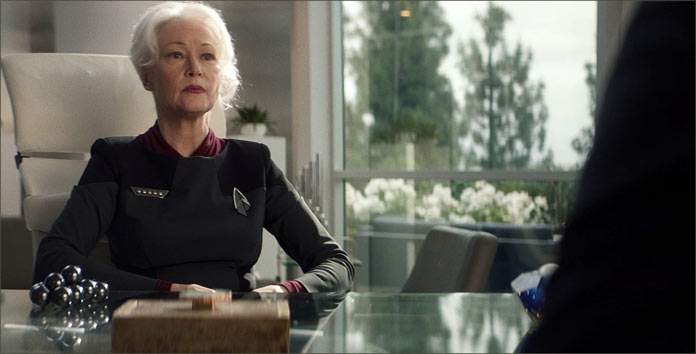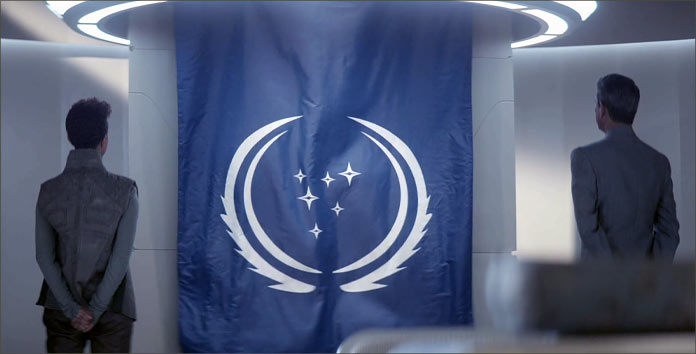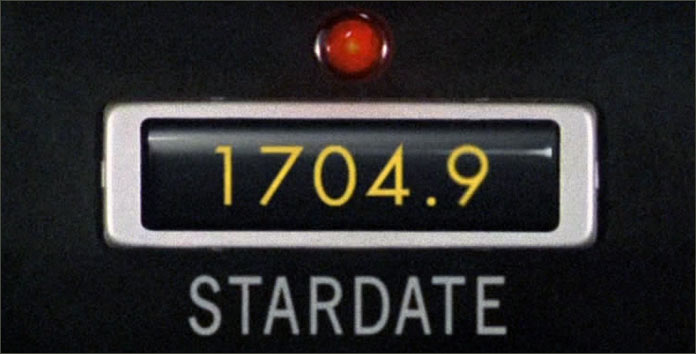Early last month, Star Trek: Picard showrunner Michael Chabon took to social media to address some fan concerns he saw raised after the first few episodes of the series debuted — and late last week, the writer/producer took up the challenge of answering fan questions directly.
On his Instagram Story, Chabon took the time to address several dozen fan-submitted questions about his career, his influences, and of course, Star Trek: Picard. The questions and answers we’ve highlighted below are direct quotations from the writer’s Instagram account.

Q: Star Trek was always about a future in which we were better than the past. Why the change of tone?
CHABON: I’ve answered versions of this question a lot, and I don’t have too much to add, but I will just gently suggest that your question is premised on inaccuracies.
The tone of Star Trek: Picard may be darker, at times, than some Trek has been, at times, in the past, and “we” are not worse. We are still as human as ever, and as likely as ever to be thrown, as Sisko once suggested, whenever we encounter the reality “beyond the windows of Starfleet.”
Q: Is there a link between Star Trek: Picard (Federation downfall) and Discovery Season 3 (Federation gone)?
CHABON: “Federation downfall”? What Federation downfall? The Federation is still very much alive and well and home to trillions (quadrillions?) of safe, housed, fed, educated citizens with the potential to lead fulfilling lives.
There was a crisis 15 years ago, in the wake of the costly Dominion War and the Romulan emergency, which had a negative impact on the lives of many people, including most of our principal characters, in one way of another, during which Starfleet (and by extension the Federation) did not acquit itself well – in Picard’s eyes.
From Admiral Clancy’s viewpoint, which is likely the mainstream view, Picard’s attitude was unrealistic, quixotic, and even dangerous. She may be right! They may be right, and both wrong. But that was fifteen years ago, and the Federation is still going strong.
Perhaps in the eyes of some, it lost its luster, its air of invulnerability, its claim to the moral high ground, a process that began during Deep Space Nine times. That is hardly a “downfall,” though.

Q: Will there be references to the political impact the Dominion War had on the Federation?
CHABON: Tried to work it in several times, in drafts. Wiser heads argued correctly that it made things just that much more intimidatingly complicated for non-fans. In the end, regrettably, it just had to be implied.
Q: Can you go into more depth about the Borg? Voyager very clearly destroys them.
CHABON: I think it would be more accurate to say Voyager very clearly implemented their plan to infect the entire Collective and destroy the transwarp network. But whether that outcome was completely successful, partly successful, or was somehow foiled (by the Borg, or by some other entity), remains an open question.
In any case, it’s not really relevant to the story told in Picard Season 1, though I would say that certainly most of the characters seem to behave as if the Borg are part of the past.
Supreme Voyager guru Kirsten Beyer and I have had many discussions on this subject and we are in pretty firm agreement that “all the Borg died” is, at best, arguable.

Q: Based on experience, what isn’t Seven more involved with the reclamation project and the xBs?
CHABON: She found herself on another past that, while difficult, was meaningful to her.
Q: I saw such sexual tension between Annika and Bjazyl. Am I right?
CHABON: Definitely.
Q: Why did the EMH not have an override function in case of potentially fatal actions [like Jurati killing Maddox]?
CHABON: Without going into specifics that might verge on spoilers… blame Rios.
Q: Could you tell us if there are plans for Picard Short Treks before Season 2?
CHABON: I would say there are not.

Q: Has anyone on the show used Stardates?
CHABON: Stardates, in my view, and I know this is going to make some people mad, are a uniquely perverse form of uninformative information. Using a stardate tells you precisely nothing. Even people who know how to interpret and convert them have to go off and interpret and convert them to have them mean something.
Giving an audience the stardate is like I wanted to know if I needed to put on a sweater or not, and you told me the temperature outside in Kelvin. “It’s 287 out.”
Q: Do you think an episodic [traditional-style] Star Trek series is in the future?
CHABON: The market determines which literary forms predominate. That has always been true, and not just on TV. When big-circulation magazines paid good money for short stories, our best writers revolutionized the form. In Germany, magazines wanted novellas; Thomas Mann wrote some of the best ever.
Short answer: when there is perceived demand for episodic TV, episodic Trek will return, though likely not in quite the same way.
![]()
Star Trek: Picard returns Thursday, March 5 with “Nepenthe” on CBS All Access and CTV Sci-Fi Channel, following internationally on Amazon Prime Video on March 6.
